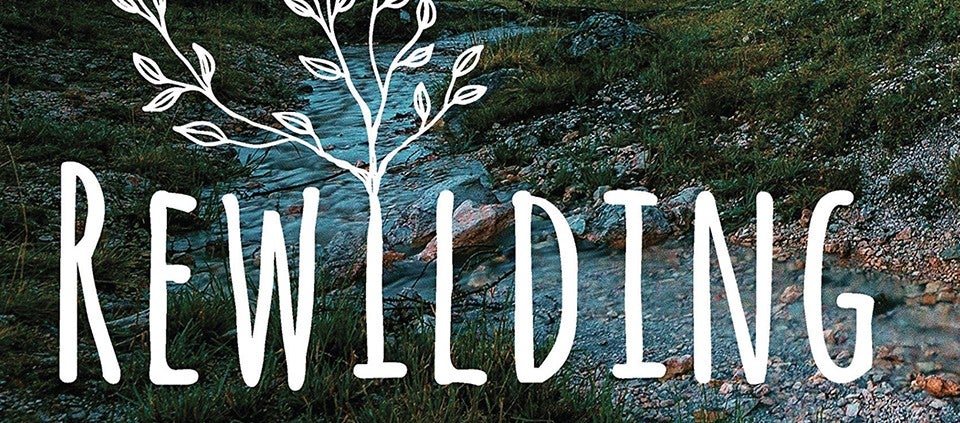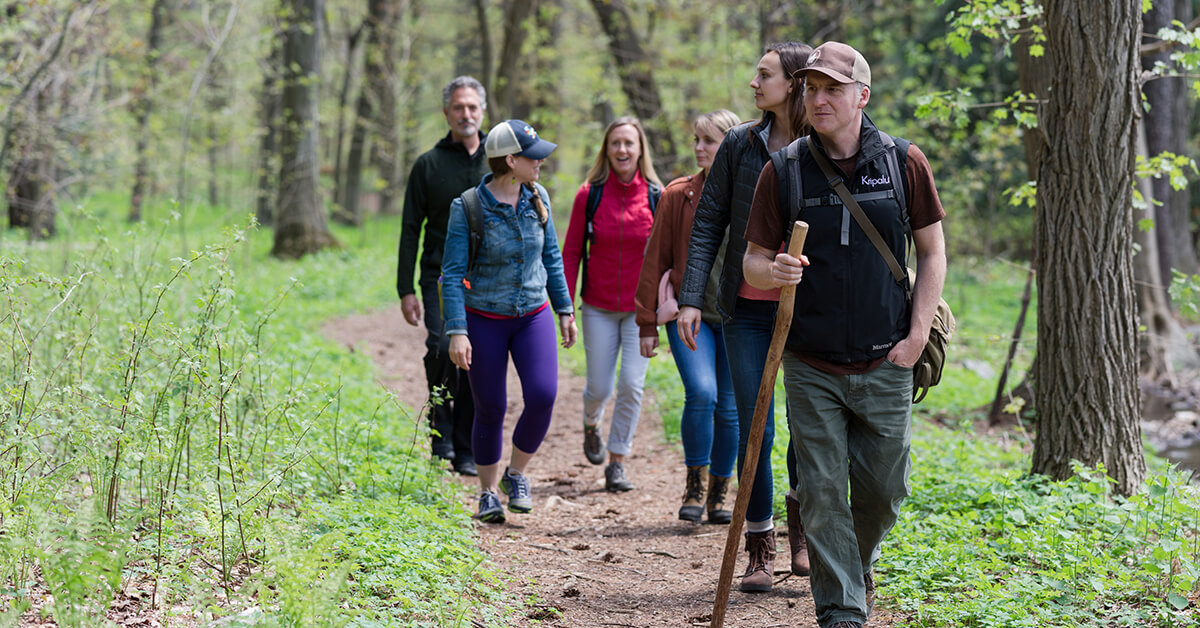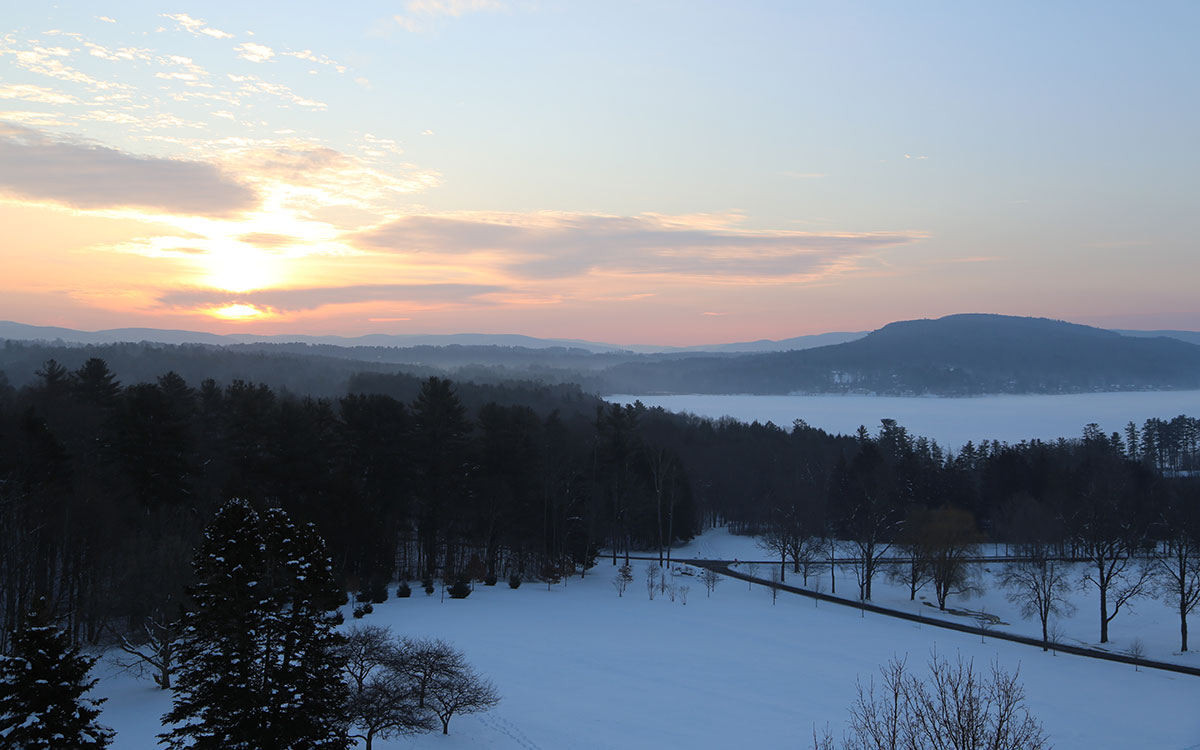Rewilding: An Excerpt from Micah Mortali’s New Book

In this excerpt from his new book, Rewilding: Meditations, Practices, and Skills for Awakening in Nature, Micah Mortali, Director of Outdoor Education and Programming at Kripalu and Founder of the Kripalu School of Mindful Outdoor Leadership, shares his early experiences of nature connection and explains the concept of rewilding—which he defines as embracing the earth, coming home to our roots, and recognizing that this planet and our local environment are priceless gifts.
As a child, I grew up spending a lot of time outdoors. My parents and I even lived off the grid for about a year while they were building our house in the woods. We heated with wood, had a pump well, and used candles and kerosene lanterns for our evening illumination. That experience had a deep and lasting impact on me, and as I grew, being outside, close to the elements was something I prioritized. Through trying times as a child, after my parents’ divorce, and through the turbulence of adolescence and young adulthood, nature was my medicine and my source of solace and inspiration. I feel very fortunate that I grew up close to the land, and had the opportunity to wander through woods and fields unsupervised as a boy. Shooting my bow and arrows at cans and stumps, climbing trees, making fires and building forts provided a sense of adventure and helped me grow in confidence and appreciate the simple and profound beauty and mystery in the natural world.
Having always had an inclination for contemplation and for adventure, time outdoors always nourished both sides of me. As a kid, I was always moving between pretending I was in Lord of the Rings or Robin Hood, to pausing and being totally swept up by the sound of wind in the birches and pondering the great questions: Who am I? What am I? How did we all get here? A small crackling fire on a quiet afternoon, on top of the old “bear cave” in the woods behind my dad’s house, was to me profoundly more moving to my soul than any human sermon I had ever heard in church on Sunday morning. The smell of dry, burning pine branches and the occasional pop of exploding sap guided me into a natural state of present-moment awareness and powerful communion with my senses and the living earth. I didn’t realize until many years later, that what for me was normal life in the woods was something foreign and strange for many other people growing up with cable TV and video games. Through outdoor pursuits, which might now be understood as elements of human rewilding, I was able to access experiences that made me feel alive and connected, while at the same time, these hunting and gathering skills seemed to invite a natural state of mindful reverie in the present moment.
As I grew up (slowly), I vacillated between my growing interest in spirituality and mysticism, which led me to study religion and eventually explore the worlds of yoga and meditation, and feeding my hunger for the outdoors. I have been practicing yoga now for over 20 years, and guiding others outdoors for just as long. I’ve been a Kripalu Yoga teacher, a mindful volunteer dishwasher (a profound learning experience), a therapeutic wilderness counselor with at-risk teens, an outdoor educator for middle schoolers, a yoga retreat leader, a residential volunteer manager, a student of primitive skills, Director of the Kripalu Schools of Yoga, Ayurveda, and Integrative Yoga Therapy, and most recently, founder and lead trainer of mindful outdoor guides in the Kripalu School of Mindful Outdoor Leadership. My work, which has evolved into supporting change agents through the many trainings and programs that we run at Kripalu, has allowed me to express my passion for mindfulness and rewilding practices in exciting ways.
I approach the topic and practice of human rewilding very much through the lens of mindfulness, which I define as “nonjudgmental, present-moment awareness.” The philosophies, methodologies, and practices of yoga also inform how I engage with rewilding as a practice. Being outside, exploring the natural world, supports a calm and alert state of mind, but learning to deepen and stabilize that state through breathing practices, meditation, and other nature-connection techniques can make your experience even more rewarding.
As my own calling to pursue this path began to take shape through the years, the need for this important work has been building across the world. With the average American now on a screen for 11 hours a day on average and spending 90 percent of their life indoors, disconnection from self, community, and nature is growing. We see the effects in rising levels of depression, anxiety, and a host of other mental-health challenges, along with an accelerating crisis in our global environment, from climate change and species loss to plastic gyres in the world’s oceans and resource conflicts. Rewilding can’t solve all these issues quickly, but I believe it can help to support a reconnection between humans and the living earth. Part of this reconnection is a remembering of what is important and essential: clean air and water, healthy ecosystems, food, water, shelter, good company …
Burying our heads in our screens and air conditioning will not help us adapt to the new world we are living into. But stepping outdoors, lifting our noses to the sky, smelling the wind, and becoming students of nature can. If we are to adapt to the times we are living in, if we are to respond with skill to the real-life conditions on our home planet, we need to be aware and alert, and we need to know basic skills to help us stay close to the wisdom of nature.
Rewilding can help us take a deep breath, walk with our feet on the ground, and sit by a fire as we listen to the wind in the trees. It can help us settle back into a wisdom that is older than language and written history, something foundational to who we are. It can help us to remember what we are, where we belong and how much we have to be grateful for on this precious planet. The seasons still turn and birds still sing in the trees. We can all take a few minutes to breathe, we can learn who we share this land with, and we can become a part of our forests and wild communities again. We just need to slow down and open up our senses to the wonder that is all around us.
Micah Mortali is lead Kripalu faculty, the Founder of the Kripalu School of Mindful Outdoor Leadership and author of Rewilding.
Full Bio and Programs
